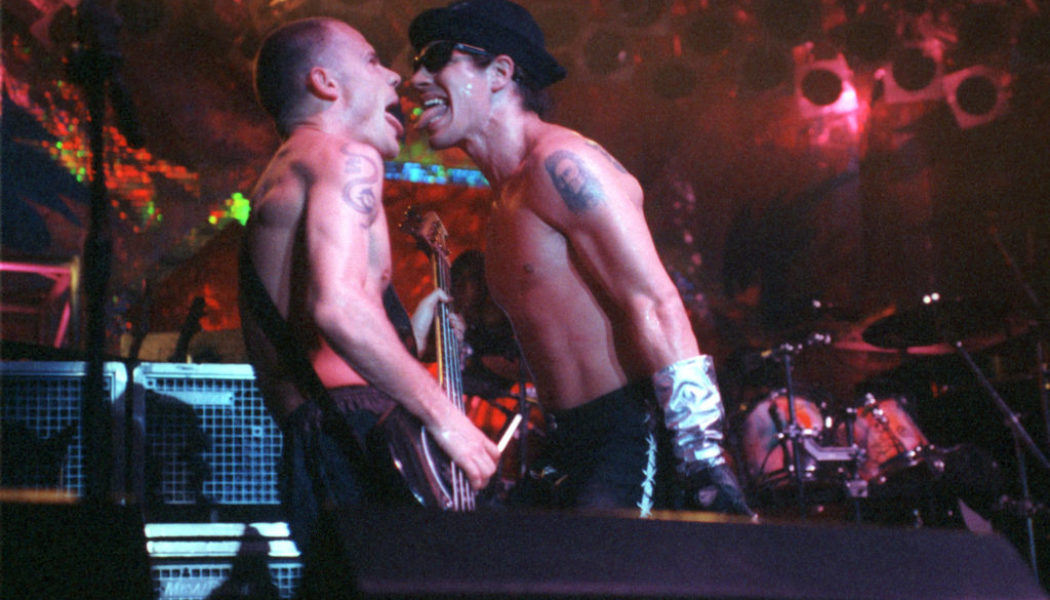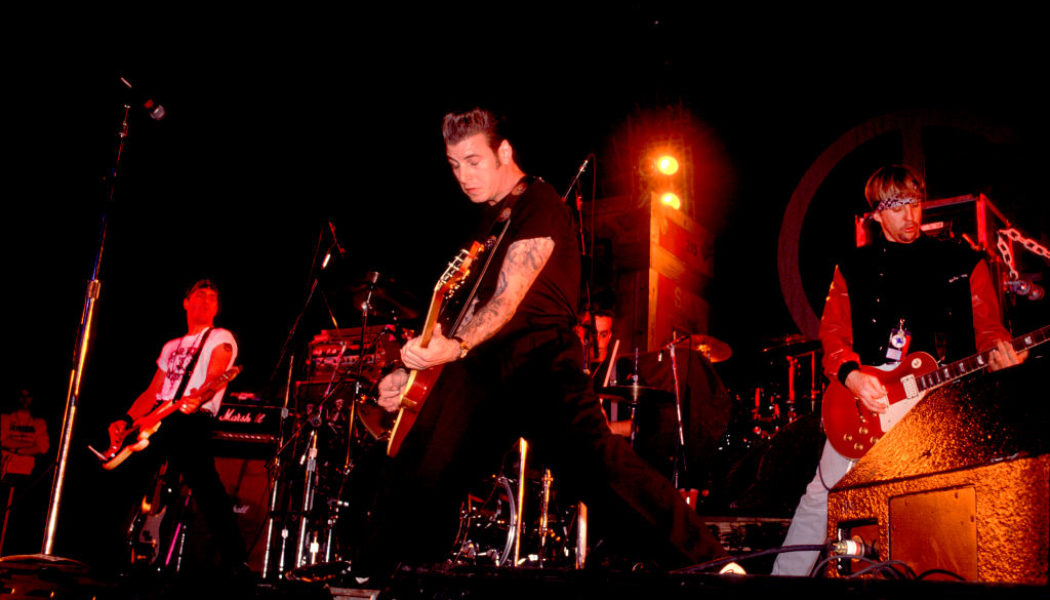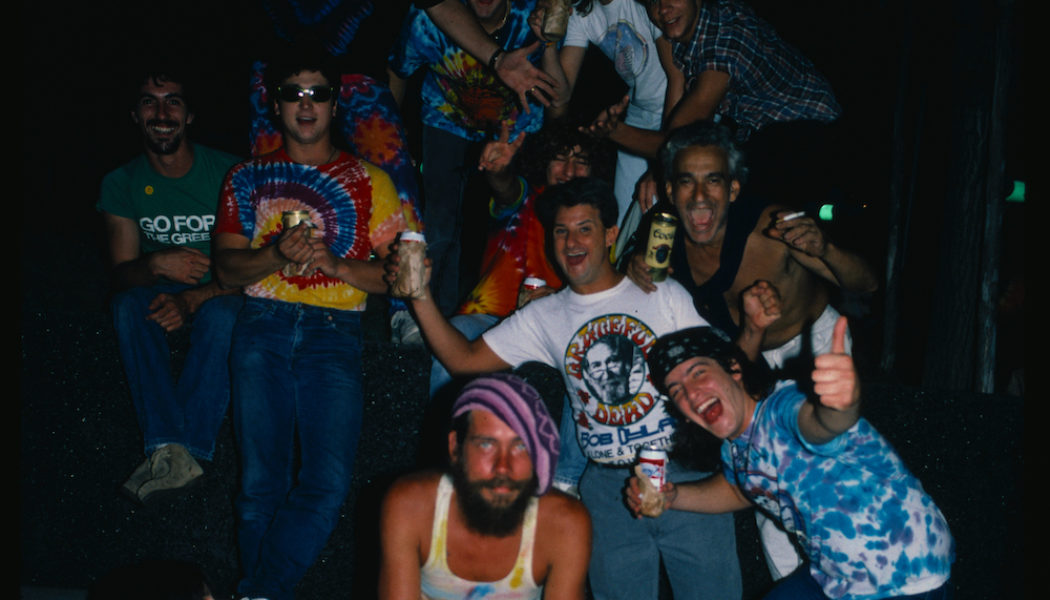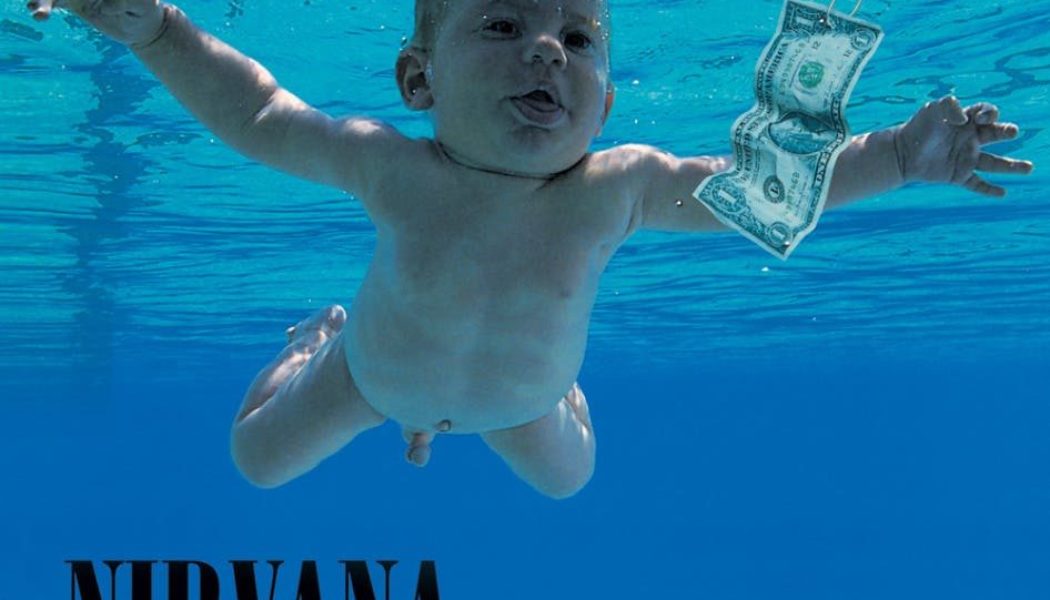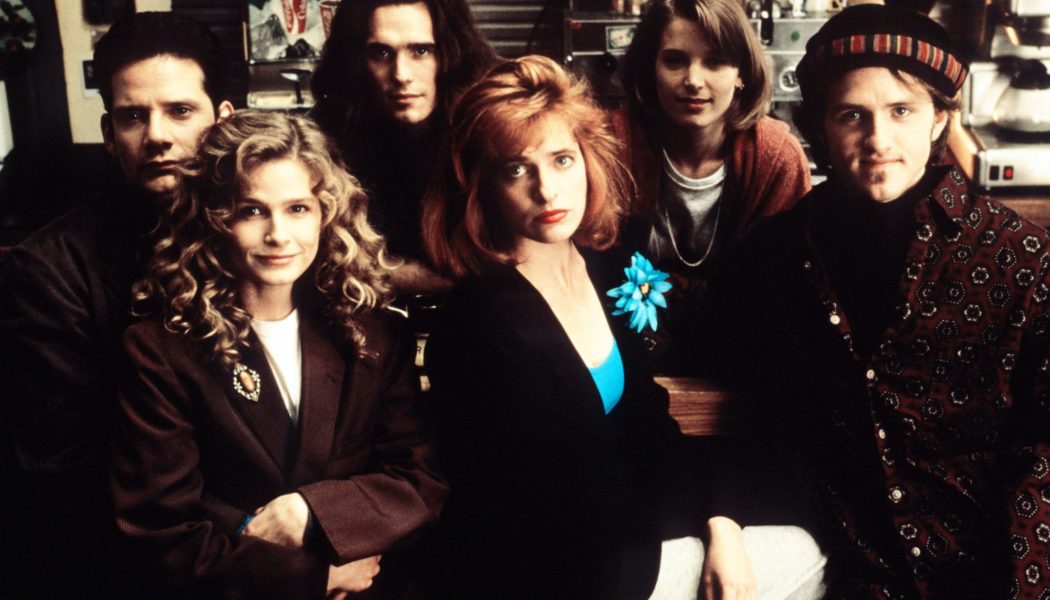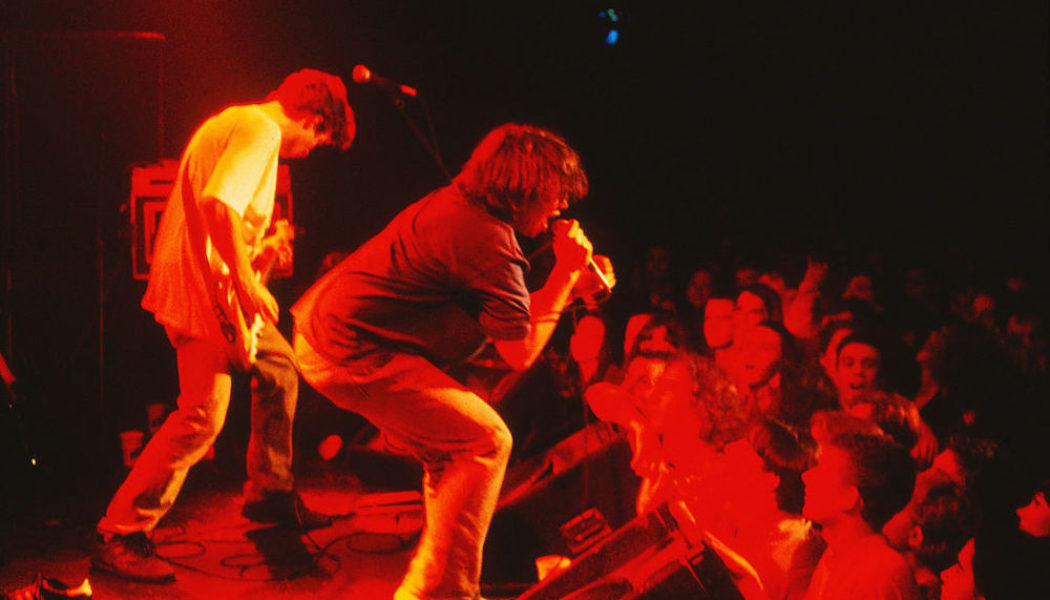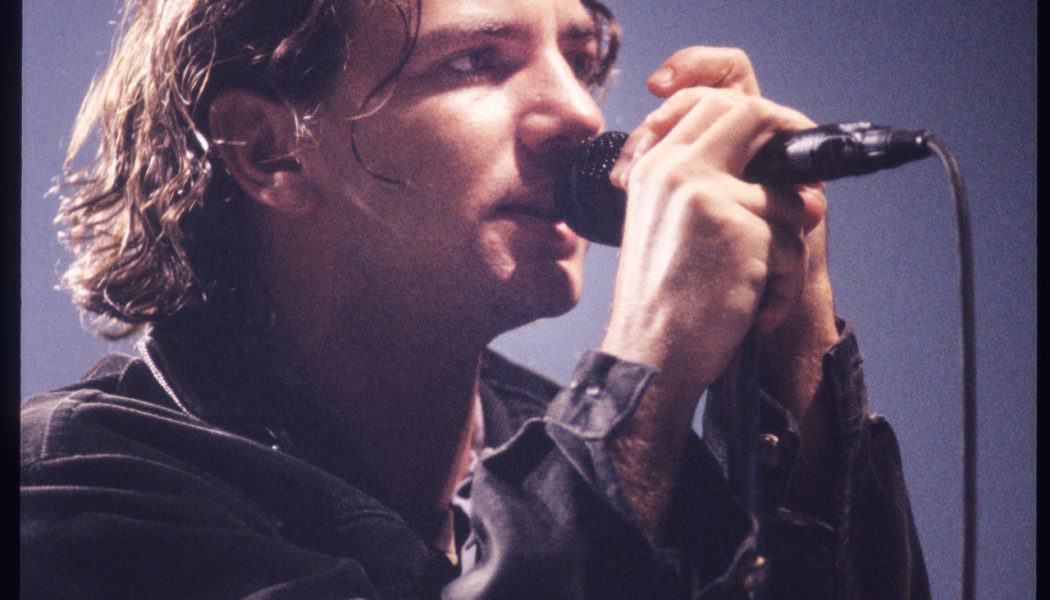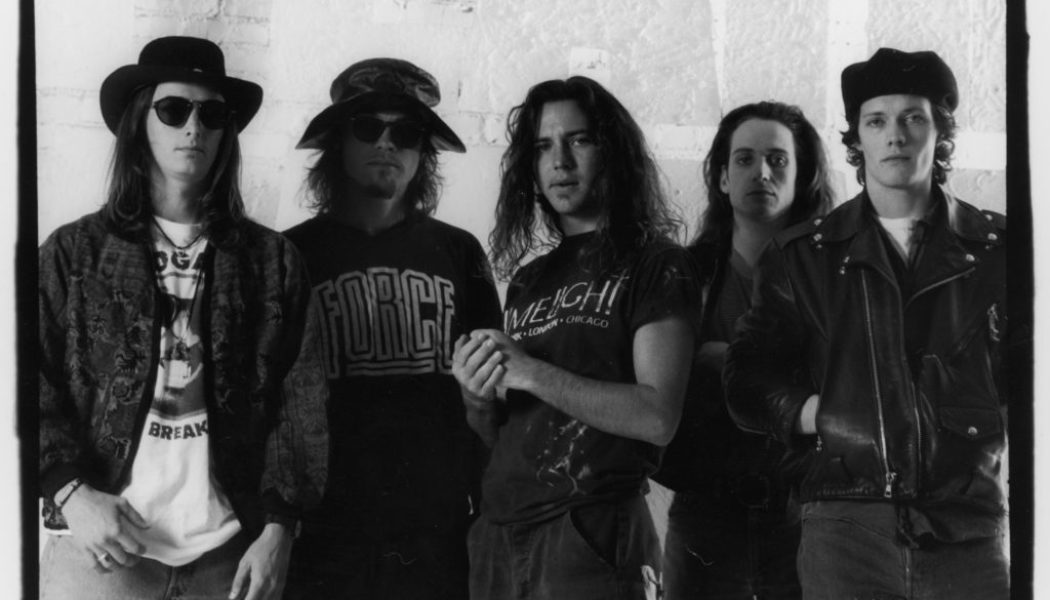1990s
Bridge Over Troubled Water: Our 1993 Red Hot Chili Peppers Cover Story
This article originally appeared in the August 1993 issue of SPIN. Until April 1986, when the return of Jack Irons, the Red Hot Chili Peppers‘ original drummer, brought some welcome reinforcements, bassist Flea was fighting a losing battle against frontman Anthony Kiedis‘s and guitarist Hillel Slovak’s growing addictions. Any drugs Flea had used in the past were of the recreational variety—pot and the occasional tab of acid. Alone, however, he was unable to stand against the tide of self-destruction that was threatening to sweep the Red Hot Chili Peppers into the abyss. For Flea, Irons’s return didn’t merely slot into place the last piece of the band’s jigsaw of friendship; it also offered him some breathing space. “Hillel was a wild partier. Before he got carried away with the ...
Todd Rundgren, Dana Carvey, and Hal Willner in Conversation: From Our 1993 SNL Issue
This story originally appeared in the February 1993 issue of Spin, which was partially written and guest-edited by members of the SNL cast. Read interviews and stories from comedy icons of the era–Chris Rock, Adam Sandler, Tim Meadows, Lorne Michaels and others–in our package of highlighted stories from the issue. The word genius is thrown around ever so loosely nowadays, but in the case of Todd Rundgren, anyone familiar with his work would agree that he fits that category. For almost three decades, Rundgren has been a major originator in the arts, from his early days leading the influential Philly-based band Nazz through his pop hits period (“Hello It’s Me,” “I Saw the Light”), to his pioneering videos in the early...
Not Fade Away: Our 1995 Neil Young Cover Story
This article originally appeared in the September 1995 issue of SPIN. It’s getting harder and harder to remember that, for much of his career, Neil Young has been regarded—if loved—as a self-destructive oddball. Even in his most celebrated decade, the 1970s, he shelved entire albums; others, such as Time Fades Away and On the Beach, were so determinedly marginal that they’ve never been reissued on CD. Then, in the ’80s, he released a notorious series of rockabilly, synth-pop, and country experiments so off-putting that his label, Geffen, eventually sued him for not sounding like himself. But starting with “Rockin in the Free World,” the anthem that bookends 1989’s Freedom, he went back to being Neil Young. Ragged Glory was a typically sprawling Crazy Horse album; Harvest Moon revisite...
High Rollers: Our 1993 Deadhead Feature
This article originally appeared in the August 1993 issue of SPIN. To a Deadhead, Las Vegas is the other side of the universe. —Bill Graham It’s a match made in heaven. —Sean, a 100-show veteran Deadhead from Burbank For the third year in a row, Deadheads descended on Las Vegas, Nevada, that unlikeliest of hippie hangouts, for a spring weekend of Grateful Dead shows. There had been grumblings the year before—from casino owners and from a local politician (whose ’67 Porsche had been dented when a Deadhead jumped on the hood), but they were shouted down and the Deadheads were invited back. Most agreed with Sean from Burbank. “It’s fun to be here,” said Kelly, a beautiful 21-year-old from Barbados who follows the Dead with her friends Moon and Molly. “It’s, like, here’s a town you’re al...
Lauryn Hill: Our 1998 Artist of the Year
This article originally appeared in the January 1999 issue of SPIN. In light of the Fugees reuniting, we’re republishing it here. A baby-on-board Lauryn Hill is feeling “fat and bothered,” hanging out with her mom and toddler son, Zion, in the kitchen of her New Jersey home. “I’m due tomorrow,” she jokes. Actually, she’s got a month to go and she’s still relatively active, planning to catch a screening of Beloved later this evening. Hill originally had a starring role in Oprah’s slavery epic, but had to drop out when she realized she was pregnant. But while the movie didn’t light any box office fires, Hill’s multiplatinum solo debut, The Miseducation of Lauryn Hill, spoke deeply to the everyday experiences of millions of young black women in 1998. And in a fractured musical landscape, it s...
Classic Reviews: Nirvana, Nevermind
This article originally appeared in the December 1991 issue of SPIN. In honor of Nevermind’s 30th anniversary, we’re republishing our original review here. After a most fine lunch on a bright, sunny New York day, Nevermind is blasting through the little box on my desk and the finance department here at the lovely SPIN offices are probably going ballistic. … But so what. Forget the new Guns N’ Roses double overkill. Forget Rush’s Roll the Bones. Nirvana has built this one for speed—that would be speed with a capital S—and it sure is fun to drive. A little bit punk, a little bit metal, a little bit country, a little bit rock ‘n’ roll. What the hell more do you want? Nevermind’s got a full-out rock assault on “Territorial Pissings,” and a beautifully harmonic “On a Plain,” and a really ...
Crowe’s Feat: Our 1992 Cameron Crowe Interview
This article originally appeared in the September 1992 issue of SPIN. In honor of Singles hitting theaters on this date in 1992, we’re republishing it here. Phoebe Cates fellating a carrot. Judge Reinhold beating off in the can. John Cusack lovelorn outside lone Skye’s window holding aloft a boom box blaring Peter Gabriel. Details such as these give director Cameron Crowe’s characters lifespans that linger on long past the closing credits. But Crowe’s most-celebrated contribution to the culture remains Fast Times at Ridgemont High’s stumbling, mumbling über-stoner, Jeff Spicoli, whose frazzled spirit was almost supernaturally caught by Sean Penn. The director has worked with a high caliber of acting talent ever since. Constructed as Love, American Style—type vignettes chronicling...
A Dinner With Ween: Our 1995 Ween Feature
This article originally appeared in the March 1995 issue of SPIN. Just another Friday night in the hard rockin’ territory of New Jersey, with two important differences: (1) I’ve never been here; and (2) it’s the last night of live music at Trenton’s legendary City Gardens. After two hours of turnpike and strip malls, I’m down with rechristening New Jersey the Garbage State. And, from what I’m seeing, City Gardens is going to need one hell of a face-lift to draw as a foofoo discotheque. No matter. Honorary homeboys Dean and Gene Ween have taken the stage with shit-eating grins and the crowd in their pockets. “We’ve played this club like 39 times,” Dean crows, before wrapping a couple of guitar chords around the show’s first inebriating hooks. Pretty soon the crowd is singing...
The Road Less Traveled: Our 1997 Pearl Jam Cover Story
This article originally appeared in the February 1997 issue of SPIN. In honor of No Code turning 25, we’re republishing this article here. Here is a joke Eddie Vedder told me. It wasn’t the only joke he told, but it was probably the best, and it bears repeating. “How many members of Pearl Jam does it take to change a lightbulb?” When Eddie Vedder asks a question of you, or you of him, or when he makes an important point, or when he shares something with you and wants a reaction, his eyebrows shoot up so they’re suddenly at right angles to each other. It brings to mind disbelieving girlfriends, mean teachers, and Satan. It’s an altogether unwelcoming look, and it’s immediately amplified by a steely glare and furrowed brow. For a moment—a long moment—you can’t help but believe thos...
Pearl of Wisdom: Our 1991 Pearl Jam Feature
This article originally appeared in the September 1991 issue of SPIN. In honor of Pearl Jam’s Ten turning 30 today, we’re republishing this article here. It’s a rock ‘n’ roll comfort thing—you wouldn’t understand. Especially if you’re a guard at Harrod’s department store in London, where Seattle’s Pearl Jam discovered that the ensemble the band wears—cut-off fatigue shorts accessorized with electrical tape, tie-dyed long underwear, and rock T-shirts—is completely misunderstood. The members of the seductively churning rock band found this out when a guard asked them to leave the premises, even though vocalist Eddie Vedder offered to go straight to the men’s department and buy something else to wear. He was denied, and Pearl Jam was escorted from the store. The guard obviously didn’t ge...
Three Men and a Good Time, Baby: Our 1991 ZZ Top Cover Story
A version of this story was originally published in the February 1991 issue of SPIN. In light of Dusty Hill’s passing, we’re republishing it here. Overheard speaking in the nasal twang of the Great Southwest, during the finale of a ZZ Top concert: “Well, talk about your everlovin’ son et lumiere! Hot damn, Vietnam!” The speaker, standing just behind me, was a lank and leather-skin English professor from the University of Texas. We had exchanged a few words earlier, when he had remarked of the similarity of the ZZ sound to that of the Rolling Stones, in such a way as to invite my response, which I didn’t deny him: “It’s probably safe to say,” I ventured in my most scholarly tones, “hurmph, hurmph, that they both come from the same bag, but have remained distinct … if you garner my innu...
